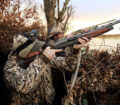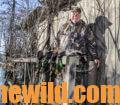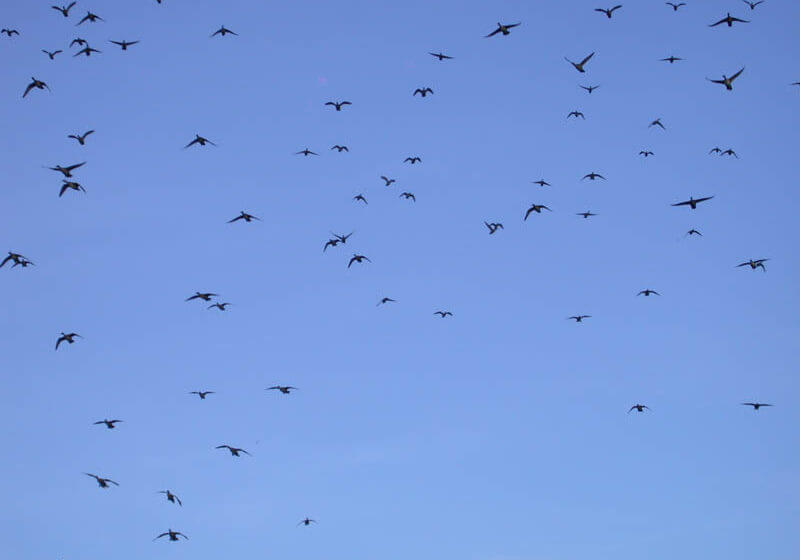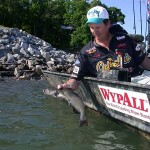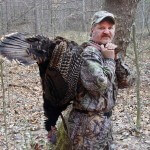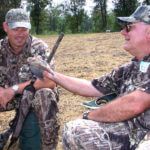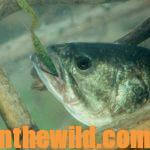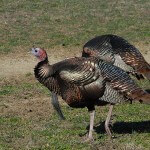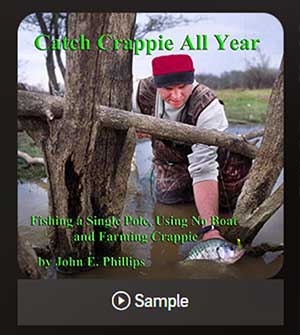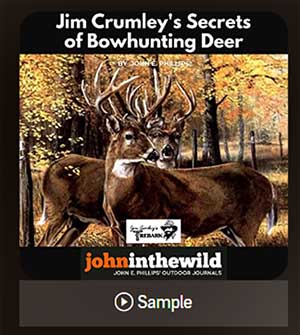Editor’s Note: Barney Calef of Cedar Rapids, Iowa, who has been hunting ducks for 48 years, is the owner of Calef Calls Inc. (www.calefcalls.net) that produces duck and goose calls.
 I’m often asked, “At the end of the season, when a severe cold front is coming in that moves the old ducks out of your area and brings new ducks into the place you’re hunting, how do you take those new ducks?” Often, about 500,000 stale ducks are sitting on the Missouri River 120 miles from my hunting camp at this time of year. Because those ducks are so close to us, if the storm is really severe, the storm can push those ducks right past us. However, if the storm isn’t so bad, and it doesn’t blow the stale ducks 120-miles away from us past our duck club, then those stale ducks become new ducks. Once fresh ducks that may have been stale ducks where they were living come into a new area, then they change into new ducks. Even though those ducks have heard a lot of calling and been hunted heavily, when they move into a new place, they really don’t know anything about where they are, where the hunters are, or what the decoy spreads look like there.
I’m often asked, “At the end of the season, when a severe cold front is coming in that moves the old ducks out of your area and brings new ducks into the place you’re hunting, how do you take those new ducks?” Often, about 500,000 stale ducks are sitting on the Missouri River 120 miles from my hunting camp at this time of year. Because those ducks are so close to us, if the storm is really severe, the storm can push those ducks right past us. However, if the storm isn’t so bad, and it doesn’t blow the stale ducks 120-miles away from us past our duck club, then those stale ducks become new ducks. Once fresh ducks that may have been stale ducks where they were living come into a new area, then they change into new ducks. Even though those ducks have heard a lot of calling and been hunted heavily, when they move into a new place, they really don’t know anything about where they are, where the hunters are, or what the decoy spreads look like there.
When new ducks are flying in during the late season, those new ducks can pick out bad duck calling. So, you’ve got to be really good then with your duck calling. You’ve got to tell those ducks what they want to hear when they want to hear it. Regardless of how many duck calls those birds have heard, or how far down the flyway they’ve come, when you blow a five to a six note hen greeting call raspy and aggressive, you can call those ducks. If you blow that five or six note call one time really good, often that’s all the calling you need to give to those ducks. If more duck hunters understand when to shut up and not be calling, they’ll take more ducks. Like I’ve mentioned earlier, in the late season, less calling is better.
 You also need to know when to call to ducks. You never call to them when they’re coming to the decoys. You only call to them when they’re leaving the decoys. When ducks are coming in to a decoy spread, they’re not looking for what’s right about the spread. They’re looking for what’s wrong about the spread. So, don’t blow the call, don’t move, and don’t call to the birds when they’re right over the top of your blind. When you blow your call, and the ducks are right over you, they know exactly who you are, and where you are, especially if you’re in an open-top blind. In a pit blind where you’re covered up, you may be able to call when the ducks are straight over you. But I absolutely won’t call to a duck until it’s past the blind. Then I give the best hen greeting or comeback call that I’ve got. The more aggressive you make that call, the more successful you’ll be in turning the ducks, even when you’re hunting stale ducks. The reason I said that you have to be good with a duck call is that I’ve learned that a person who calls confidently sounds very different from a hunter who calls timidly. The timid duck caller isn’t going to get as many good results as the confident duck caller who calls aggressively.
You also need to know when to call to ducks. You never call to them when they’re coming to the decoys. You only call to them when they’re leaving the decoys. When ducks are coming in to a decoy spread, they’re not looking for what’s right about the spread. They’re looking for what’s wrong about the spread. So, don’t blow the call, don’t move, and don’t call to the birds when they’re right over the top of your blind. When you blow your call, and the ducks are right over you, they know exactly who you are, and where you are, especially if you’re in an open-top blind. In a pit blind where you’re covered up, you may be able to call when the ducks are straight over you. But I absolutely won’t call to a duck until it’s past the blind. Then I give the best hen greeting or comeback call that I’ve got. The more aggressive you make that call, the more successful you’ll be in turning the ducks, even when you’re hunting stale ducks. The reason I said that you have to be good with a duck call is that I’ve learned that a person who calls confidently sounds very different from a hunter who calls timidly. The timid duck caller isn’t going to get as many good results as the confident duck caller who calls aggressively.
 To learn more about hunting, go to https://johninthewild.com/books to see John E. Phillips’ Kindle, print and Audible books.
To learn more about hunting, go to https://johninthewild.com/books to see John E. Phillips’ Kindle, print and Audible books.

